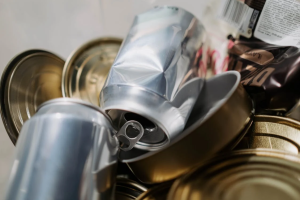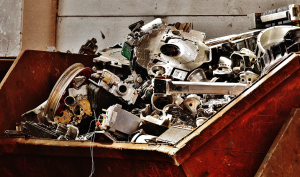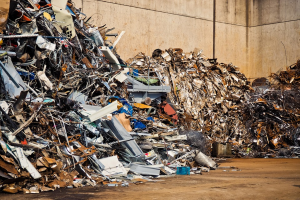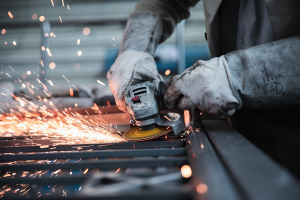Scrap metal recycling is one of the most efficient and sustainable ways to reduce waste and conserve natural resources. With a growing focus on reducing environmental impact, recycling has become more important than ever. At Morecambe Metals, we’re proud to be part of this vital industry, using advanced technology and years of expertise to give old metal a new life.
Whether it’s a piece of scrap from a construction site or an old household appliance, the recycling process ensures these materials are repurposed rather than wasted. Here’s a closer look at how this fascinating process works.
Why Recycle Scrap Metal?
Recycling scrap metal is one of the easiest ways to help the planet while making the most of our resources. Metals like steel, aluminium and copper can be recycled over and over without losing their quality, which means we can cut down on mining and protect the environment. It also takes less energy to recycle metal than to produce it from scratch—recycling aluminium, for example, uses up to 95% less energy. By keeping scrap metal out of landfills, we’re reducing waste and pollution too.
Recycling scrap metal has some great economic benefits. It creates jobs in recycling facilities, lowers costs for manufacturers and even puts extra cash in your pocket if you sell your scrap. Take a look at what types of scrap metal are the most valuable. By turning what might seem like junk into something valuable, we’re not just helping the planet – we’re boosting local economies too. Whether you’re in it for the money or the environment, recycling metal is a smart move all around.
Recycling Scrap Metal
Turning old metal into something new doesn’t happen by magic – it’s a carefully managed process. At the heart of this transformation is recycling, a journey that ensures valuable materials don’t go to waste. From collecting scrap to sorting and processing it, every step plays a vital role in giving metal a new lease of life.
Let’s break down how the scrap metal recycling process works.
Collection
- Every recycling journey starts with the collection of scrap metal. This involves gathering unwanted metal from places like construction sites, manufacturing plants and household waste. At Morecambe Metals, we partner with local businesses and communities to streamline the recovery process.
- By making collection easy, we make sure that no valuable resource goes to waste. Imagine old car parts, broken machinery and discarded pipes being transformed into something new – it all starts here.
Sorting
- Once the metals are collected, the next step is sorting. This is an important part of the process, as different metals need to be separated to ensure the recycling process is as effective as possible. Ferrous metals, like steel and iron, are separated from non-ferrous metals, like aluminium, copper, and brass.
- Advanced sorting technology, including powerful magnets, sensors and even optical sorting machines, plays a key role in this process. By using cutting-edge techniques, we can sort large volumes of metal quickly, carefully and easily.
Shredding and Cutting
- After sorting, it’s time to reduce the size of the scrap metal. Large pieces are shredded or cut into smaller, more manageable sizes. This makes the material easier to transport and prepares it for the next phase by increasing the surface area.
- Increased surface area means the metal will melt better, saving time and energy. From giant industrial metal shredders to heavy-duty shears, the machinery used in this phase is designed to handle even the toughest materials.
Melting
- Once the metal is prepared, it’s fed into specialised furnaces for melting. Each furnace is tailored to a specific type of metal for maximum efficiency. The furnaces run at extremely high temperatures to turn the scrap into molten metal.
- By recycling metals instead of extracting raw materials, we use way less energy. For instance, recycling aluminium uses up to 95% less energy than producing it from bauxite ore. This shows just how much energy can be saved by recycling.
Purification and Refining
- Before the molten metal can be repurposed, it must be purified to meet high-quality standards. Techniques like electrolysis, chemical treatments and advanced filtering systems are used to remove impurities.
- This means that the final product is of great quality, ready for use in manufacturing. Purification improves the usability of the recycled metal and adds value to the entire recycling process.
Repurposing
- The final step in the recycling process is repurposing. Once purified, the metal is cooled, solidified and transported to manufacturers. These recycled metals find new life in countless industries, from cars and construction to electronics and packaging.
- For example, your next car might have recycled steel, or a can you’re drinking from could be made from recycled aluminium. It’s all about sustainability and improving the manufacturing cycle.
The Environmental Benefits of Scrap Metal Recycling
Scrap metal recycling isn’t just about saving resources – it’s about creating a sustainable future. By reducing the demand for mining, recycling conserves resources and prevents habitats from being destroyed. The recycling process uses significantly less energy than extracting and processing raw materials, helping to lower greenhouse gas emissions. This means less pollution and a healthier planet for future generations.
Another key benefit is waste reduction. Recycling diverts scrap metal from landfills, where it would otherwise take up space and potentially release harmful substances into the environment. By transforming waste into valuable resources, we’re contributing to a cleaner and greener world.
At Morecambe Metals, sustainability is at the heart of everything we do. From helping businesses meet their waste management goals to promoting a circular economy, we’re proud to play our part in building a more sustainable future.
Contact our team of experts to find out more about scrap metal recycling.





